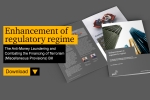Multi-territory findings — March 30, 2020
PwC’s COVID-19 CFO Pulse Survey

This outlook is amplifying the pessimism identified by CEOs in PwC’s 23rd Annual Global CEO Survey. In late 2019, before the first coronavirus cases had been reported, more than half of the CEOs surveyed believed the rate of global GDP growth would decline in 2020. Only 27 percent of CEOs reported feeling “very confident” in their companies’ prospects for revenue growth over the next 12 months — a low not seen since 2009
To monitor the business and economic impact of coronavirus, PwC will be conducting its COVID-19 CFO Pulse Survey every two weeks. We’ll be able to track financial leaders’ perception of events as they unfold, as well as identify emerging priorities and trends.
How finance leaders around the world are responding to the COVID-19 crisis
As the coronavirus (COVID-19) outbreak spreads, finance leaders are proactively taking steps to contain costs and prepare their businesses for a slowdown in economic activity. This is the case for the majority of executives surveyed, even though the spread of the pandemic has been uneven around the world. This has prompted governments like Thailand to announce a broad lockdown, while countries like Qatar said they would ban all gatherings but have yet to order a country-wide lockdown.
- Unsurprisingly, more than four in five (82%) of respondents say that the outbreak has the potential to significantly impact their businesses
- Over half (52%) are considering measures to contain costs
- 75% of respondents expect that their business would be back to normal within three months if COVID-19 were to end immediately
What are your top three concerns with respect to COVID-19?
Bases: 153
What is your company's current level of concern related to COVID-19?
Bases: 153, 55
The findings signal CFOs’ increasing concerns as the world slips into what the International Monetary Fund now considers a global economic recession due to COVID-19. The IMF expects a liquidity crunch, so it’s unsurprising that 67% of CFOs from multi-territories rate the possibility of a global recession as their top concern.
Many (60%) also worry about the financial impact on operations, liquidity, future periods and capital resources, as well as a reduction in productivity (44%). Despite the fast-changing nature of COVID-19 and the limited — and sometimes conflicting — information about the virus, only 13% said they are concerned about not having enough information to make good decisions.
Pulling back on spending
A majority of multi-territory finance leaders surveyed report that they have already taken measures to contain costs, and many have deferred or canceled investments. They are also weighing additional moves: 55% of multi-territory finance chiefs are considering measures to contain costs. Nearly half (47%) report that their company is evaluating whether to delay or cancel planned investments, with facilities and/or general capital spending the most likely areas targeted for deferrals or cancellations. In comparison, finance executives based in the US and Mexico are more likely to consider additional measures, such as changing their M&A strategy.
Business leaders are considering these initiatives as several central banks around the world have lowered interest rates amid the outbreak, and various governments have started to take additional steps to provide relief. For example, Switzerland is setting up plans for stimulus spending to support people and businesses that have been sidelined by public health measures implemented to contain the virus, and the US passed a $2 trillion economic stabilization package on March 27. Businesses are also facing potentially significant and pressing tax challenges. PwC specialists collaborated to create a tax response resource to help inform companies of measures local tax authorities are taking in response to the crisis.
Which of the following financial actions is your company considering as a result of COVID-19? (Select all that apply.)
Bases: 153, 55
Expecting impacts to the workforce
When asked about the impact on the workforce over the next month, about half (52%) of multi-territory respondents expect productivity losses due to the lack of remote work capabilities. This compares with 60% of their counterparts in the US and Mexico, where large-scale social distancing is already under way. The shift to remote work can be bigger than many companies realize, and productivity impacts are possible in the short term as teams learn how to collaborate and connect in new ways, while dealing with personal and family well-being matters. The crisis is also revealing immediate infrastructure gaps for many businesses, such as broadband access.
The findings show expectations that the virus will affect the workforce in many ways over the next month. Just under one-third (30%) anticipate higher demand for employee protections, such as expanded sick leave or benefits, over the next month. Moreover, nearly one-third (32%) of multi-territory respondents expect layoffs.
As a result of COVID-19, which of the following does your company expect to occur in the next month? (Select all that apply.)
Bases: 153, 55
Considering supply chain implications
The outbreak’s impact on global supply chains is fast-changing. For example, even as production ramped up in March in China, COVID-19 spread to regions that are integral to outsourced technology and business process services, such as India. At this moment, the effect on supply chain strategies is mixed: While close to half (47%) of multi-territory finance leaders say they don’t believe they need to make a change, the rest say they’re considering their next moves or have yet to decide how to respond. Relationships with suppliers and scenario-planning capabilities have been put to the test during the crisis. Companies should plan for recovery and target time to remodel their supply chains in light of new risk and competitive performance dimensions.
As a result of COVID-19, are you considering changing the breadth of your supply chain (e.g., vendors, facilities, markets)?
Bases: 153
Bouncing back?
Companies are dealing with immense uncertainty as the effects of COVID-19 on their businesses and the economy become more widespread. So how long do finance executives think it would take to recover if the outbreak were to end immediately? Multi-territory respondents are cautiously optimistic: 75% say their business would return to normal in less than three months, similar to sentiments shared in the US and Mexico. Still, 21% of multi-territory finance leaders say it would take three to six months to get back to normal.
If COVID-19 were to end today, how long do you estimate it would take for your company to get back to business as usual?
Bases: 153
To what extent do you plan on changing your disclosures as a result of COVID-19?
Bases: 153
We expect more companies to explore different scenarios regarding the duration of the outbreak to assess the range of potential impacts on their financial performance. Leaders are also considering ways to handle investor communications. Companies should have a firm grasp on the full scope of financial impacts when stakeholders ask — because they will ask.
When questioned about plans to change disclosures, 49% of multi-territory respondents say it’s currently too difficult to assess what changes will need to be made, if any.
Facing the challenge
It's clear that multi-territory CFOs, like those in the US and Mexico, are facing daunting challenges. What's also clear is that they understand those challenges and are taking concrete steps to deal with them. As they do so, we will continue to track and report on their progress.
About the survey
To help identify the business and economic impact of COVID-19, PwC is conducting a biweekly survey of finance leaders globally. Of the 153 surveyed for the multi-territory report during the week of March 23, 2020, respondents were from a cross-section of industries and based in Bahrain, the Netherlands, the Philippines, Portugal, Qatar, Switzerland, Thailand and the United Arab Emirates. Concurrently, we surveyed 55 finance leaders in the US and Mexico. The next set of results will be released on April 13, 2020.
















